The Last Gangster

Brief Synopsis
Cast & Crew
Edward Ludwig
Edward G. Robinson
James Stewart
Rose Stradner
Lionel Stander
Douglas Scott
Film Details
Technical Specs

Synopsis
Soon after notorious New York gangster Joe Krozak brings his innocent wife Talya from Europe, they learn that she is pregnant. Despite his henchman "Curly's" warnings to go easy for a while, Joe has three of the Kile brothers, members of a rival gang, murdered. Although the police cannot find enough evidence to link Joe to the crime, he is soon arrested and convicted for tax evasion and sent to Alcatraz. Though all of his appeals fail and the warden at Alcatraz makes him realize that he is no longer a "big shot," Joe maintains his cocky attitude. When Talya comes to visit him with their new baby, she questions him about accusations made in the press, but he dismisses them and only seems interested in the baby.
When she leaves, reporters harass her and one, Paul North, puts a gun in the baby's hand for a picture with the caption "Public Enemy No. 1, Jr." Desperate, Talya confronts Paul and his editor, but, while Paul is remorseful, his editor shows Talya information about Joe's crimes and she realizes the truth. The next time she visits Joe, she doesn't bring the baby. Joe is enraged and threatens her, but she tells him that she is going to change the baby's name and move away. Ten years later, after hard work and solitary confinement for prison troubles have weakened Joe, he is finally released. He is met by Curly who says that the "boys" need him to lead them again, but he soon discovers that Curly is only interested in obtaining any money that Joe had hidden over the years.
Meanwhile, Talya has married Paul, who has since become an editor, and they have reared baby Joe as Paul, Jr. Their happiness over the boy's school award and a weekend camping trip is shattered, however, when Paul, Jr. is kidnapped by Curly's men who hope that seeing the boy will make the resistant Joe talk. Although the boy does not know who Joe is, and Joe pretends at first that he is uninterested, Joe's paternal feelings and pride at the boy's character give him the strength to break out of Curly's hideout. Although Paul, Jr. thinks that Joe is "mixed up" about thinking that he is his son, he is fond of Joe and willingly goes with him.
They eventually go back to Talya and Paul's house and Joe lovingly puts Paul, Jr. to bed. When Talya thanks him for returning the boy, Joe tries to act as if he doesn't care, then leaves. Outside, Joe is confronted by Acey Kile, the brother of the gangsters whom Joe had ordered killed many years before. Acey threats to kill Joe have no effect until he says that he also plans to tell the newspapers Paul, Jr.'s true identity and ruin the boy's life. Joe then kills Acey, but is mortally wounded himself. As Joe dies, Joe's hand clasps Paul, Jr.'s school medal, "for outstanding achievement," which the boy had given to him.

Director

Edward Ludwig
Cast

Edward G. Robinson
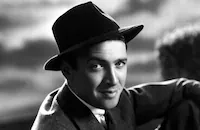
James Stewart

Rose Stradner

Lionel Stander

Douglas Scott

John Carradine
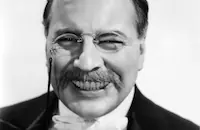
Sidney Blackmer
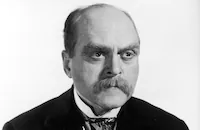
Grant Mitchell

Edward S. Brophy

Alan Baxter

Frank Conroy

Louise Beavers

Moroni Olsen
Ivan Miller
Willard Robertson

Donald Barry
Ben Welden
Horace Macmahon
Edward Pawley
John Kelly
David Leo Tillotson
Jim Zahner
Dick Holland
Billy Smith
Reggie Streeter

Douglas Mcphail
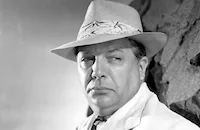
Cy Kendall

Pierre Watkin

Phillip Terry
Fredrik Vogeding
Edward Marr

Walter Miller
Paul Sutton
Mary Dees

E. Alyn Warren
Charles Coleman
Wade Boteler
Broderick O'farrell
Mitchell Ingraham
Billy Arnold
Arthur Howard
Cyril Ring
Allen Mathews
Eddie Foster
Al Hill
Huey White
Sammy Finn
Charlie Sullivan
Brooks Benedict
Jack Raymond
Martin Turner
Chris Frank
Jack Cheatham
Orville Caldwell
Ted Oliver
Philip Tully
Bill Hunter
Jack Gardner
Wally Maher
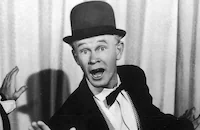
William Benedict
Larry Simms
Frederick Burton
Billy Dooley
Ernie Alexander
Don Roberts
Charles Sherlock
Harry Strang
Ernest Wood
Harry Lash
Frank Marlowe
Hal Craig
Ralph Mccullough
Bert Moorhouse
Allen Fox
Frank Dufrane
Nick Copeland
Lee Powell
Bud Marshal
Jack Stoney
Gene Coogan
Jerry Jerome
William Wagner
George Magrill
Priscilla Lawson
Shirley Chambers
Victor Adams
Dick Rush
Dick Allen
Jimmy Brewster
Leo Phelps
Crew
Adrian
Robert Carson
Daniel B. Cathcart
Cedric Gibbons
Ben Lewis
John Lee Mahin
Lou Ostrow
Douglas Shearer
Slavko Vorkapich
Edward Ward
William A. Wellman
Edwin B. Willis
Dolph Zimmer

Film Details
Technical Specs

Articles
The Last Gangster
And it did, with audiences eager to see Edward G. Robinson in the type of role they loved best. Here, he's an aging racketeer who wants a son who can follow in his crooked footsteps. Being of Slavic background, he travels to Europe to find a wife from his homeland. Everything goes to plan - the wife, the trip back to America, the birth of the son - until Robinson is convicted for tax evasion. While he's in Alcatraz, his naive wife learns the truth about him and runs away to start a new life with their son and newspaper reporter James Stewart, who is sympathetic to her situation. But once out of jail, Robinson starts to track them down.
Fast-moving and entertaining, The Last Gangster featured one of James Stewart's first significant leading roles at MGM, where he was still being groomed for stardom after making eleven films over two years. Stewart did very well as the humane reporter but looked ridiculous with a moustache. He learned a lesson - he wouldn't wear one again until Fools' Parade (1971).
Playing Robinson's wife was an Austrian actress named Rose Stradner. Variety noted her performance: "Rose Stradner, from Vienna stage, is making her film debut in the U.S. As an actress, her talents lie on the dramatic side. She's attractive enough to win attention, too." In truth, Stradner's career quickly faded. She appeared in a 1939 Columbia picture, Blind Alley, then married writer-producer (and future director) Joseph Mankiewicz. Except for a small role in The Keys of the Kingdom (1944), which Mankiewicz wrote and produced, she retired from the screen to raise the couple's two sons. Sadly, in 1958 she committed suicide by a drug overdose.
The Last Gangster is really Edward G. Robinson's movie, as he once again delivers a powerhouse portrayal of a hood with some human decency lurking inside. At this point Robinson had just re-signed with Warner Bros. in a deal that gave the star much more autonomy and power. The studio was offering him crime script after crime script, but Robinson turned them all down, wanting to move away from the genre. "The scripts were all bad," he later wrote, but "the truth is I was setting up my independence of action with Warner's. It seemed necessary to exercise the clauses in the new contract that gave me approval. I had to show that I meant it." Why, then, did Robinson accept an offer from MGM to play in a movie called The Last Gangster? Robinson admitted the irony, writing, "I, who had script approval, hoping never again to play a gangster, now agreed to play an aging one. I know now that the decision to accept the Metro offer was made out of bad temper, anxiety, and the ever-mounting costs of the remodeling of [my] house. Money was the overriding consideration, not art. And it's rather a relief to be able to admit that thirty-five years later."
Robinson described Metro as "politically the most schizophrenic of lots. The executives, almost to a man, were antiliberal; the writers and lesser executives were fellow members of mine in organizations to oppose the Nazis. Thus, the commissary divided itself into tables where political differences were minimized. The screams of rage as writer would confront director on the subject of Hitler's entry into the Rhineland made it quite impossible to have a bacon and tomato on whole wheat toast in peace. Eventually I resorted to having lunch in my dressing room; it is quite impossible to do justice to a role after you've spilled your guts out on the subject of the Sudetan Germans."
The Last Gangster was directed by Edward Ludwig, but also in the credits is the name of William Wellman. The master director co-wrote the story, and years later he recounted the colorful reason why - in short, he "had gotten in wrong with Louis B. Mayer." Wellman had recently come to MGM and directed a couple of movies there, and one day he and fellow director Woody Van Dyke found themselves called into Mayer's office. The studio chief announced that he wanted to use Wellman and Dyke "to shame these other directors to be able to make pictures as fast and as competently and for the amount of money that you two do." He added, "So I'm your general and you're my two sergeants." This rubbed Wellman the wrong way and he told Mayer, "if you think you're hiring me for a fink, you're nuts." Mayer was furious, and as Wellman recalled, he and Dyke "walked out of that office and then we were in the doghouse."
As revenge, Mayer didn't let Wellman direct. He simply paid him week after week without any assignment. Wellman was going crazy with frustration and finally he called up the No. 2 studio executive, Eddie Mannix, with an idea. Wellman would write scripts, and if Mannix liked them, he would buy them. If not, he wouldn't. Mannix agreed, and Wellman, teaming with young contract writer Bob Carson, promptly churned out The Last Gangster. They also wrote A Star is Born (1937), which Wellman ended up directing for David O. Selznick.
Producer: Lou L. Ostrow
Director: Edward Ludwig
Screenplay: Robert Carson (story), William A. Wellman (story), John Lee Mahin
Cinematography: William Daniels
Film Editing: Ben Lewis
Art Direction: Cedric Gibbons
Music: Edward Ward
Cast: Edward G. Robinson (Joe Krozac), James Stewart (Paul North, Sr.), Rose Stradner (Talya Krozac), Lionel Stander (Curly), Douglas Scott (Paul North, Jr.), John Carradine (Caspar).
BW-82m. Closed captioning.
by Jeremy Arnold

The Last Gangster
Quotes
Trivia
Notes
In its review of the film, Variety pointed out that, although Edward G. Robinson's character is sent to Alcatraz in 1927, it did not become a federal prison until 1933. It also mentioned that income tax evasion was not used to imprison gangsters until several years after that part of the story takes place. Reviews also mentioned that this was the American film debut of Austrian actress Rose Stradner. According to Film Daily, Stradner's name was to be changed to Andrea Marlow for films, however, she apparently never used the name. Stradner, who married M-G-M producer Joseph L. Mankiewicz in 1939, made only two additional films before her death in 1958, Columbia's Blind Alley, directed by Charles Vidor in 1939 and Twentieth Century-Fox's The Keys of the Kingdom in 1944, directed by John M. Stahl and produced and written by Mankiewicz. According to news items, M-G-M had at one time negotiated with Grand National to borrow actress Anna Sten to play the part of Rose. Robinson was borrowed from Warner Bros. for this film.















